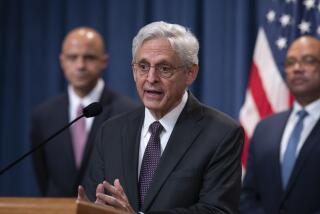U.S.-Iran Relations Hurt but Probably Not Crushed
- Share via
WASHINGTON — The long-awaited Khobar Towers bombing indictments that implicate Iran in the murder of 19 U.S. service personnel seem certain to further strain the already frosty Tehran-Washington relationship. But the damage could have been far greater if the suspected Iranian officials had been charged with the crime.
A federal grand jury reported Thursday that “then-members of the Iranian government” inspired, supported and directed the terrorists who staged the June 1996 attack, but it did not identify or charge them.
Although FBI Director Louis J. Freeh insisted that “diplomatic considerations played no part” in the government refusal to indict any Iranians, nongovernmental foreign policy experts say the decision certainly eases the political fallout for both countries.
“There will be an impact on the relationship,” said Edward Walker, who was assistant secretary of State for Near East policy until earlier this year. “But the impact will not be as great as if a serving official of the Iranian government was indicted.”
Walker agreed with Freeh and Atty. Gen. John Ashcroft that individual Iranians were not indicted because the evidence against them was not specific enough. But other U.S. experts suggested that the State Department prevailed in a behind-the-scenes debate over the wisdom of confronting the government of Iran’s recently reelected reformist president, Mohammad Khatami.
“I’ve been engaged in this issue for some time,” Walker said. “I think the Justice Department has gone all out to do its job. The Justice Department needs evidence that will hold up in U.S. courts. The Justice Department doesn’t pull punches. If they had the evidence, they’d go with it.”
Nevertheless, the failure to indict specific Iranians prevents the case from ballooning into a dangerous international crisis.
“The problem is that when you name someone you then have to do something about it,” said Brian Jenkins, a terrorism expert and a senior advisor to the president of the Rand Corp. think tank in Santa Monica. “That can turn into lengthy and tortuous sagas that can become obstacles to achievement of other diplomatic goals.”
Jenkins said the administration would have had no choice but to seek extradition of indicted Iranians. And if the Iranian government refused to hand over the suspects, as it almost certainly would do, the United States would have to impose economic sanctions or take military action, steps that probably would produce negative repercussions, he added.
Moreover, foreign policy specialists said, indicting Iranian officials would choke off any prospect for an improvement in relations between Washington and Khatami’s government, which was reelected last month on a platform of reforming Iranian institutions. Nothing in the indictments links Khatami to the bombing, which took place before his first election victory, at a time when he was an obscure mid-level cleric. Besides, the Iranian officials implicated in the attack almost certainly work for one of the country’s security or intelligence agencies, which, under Iran’s unusual government structure, report to the country’s supreme leader, Ayatollah Ali Khamenei, and not to Khatami.
Lawrence Korb, a former Pentagon official now on the staff of the Council on Foreign Relations in New York, suggested that federal prosecutors wanted to have an ironclad case against the Iranians before taking the diplomatic risks of bringing the indictment.
“They don’t want to give ammunition to those in Iran who don’t want to have good relations with us,” Korb said. “It is not just justice that is involved here; there are foreign policy implications as well.”
Of course there are plenty of reasons for U.S.-Iran friction that have nothing to do with the Khobar Towers. The State Department’s most recent report on international terrorism said Iran is “the most active state sponsor of terrorism” in the world. The Tehran government has long been known as the patron of Hezbollah, a Shiite Muslim terrorist group active in Saudi Arabia, Lebanon, Syria and some other Arab countries.
There was no mention in the indictments of Osama bin Laden, the top name on Washington’s list of most wanted terrorists. Although Bin Laden and Hezbollah both assert the objective of driving the United States out of the Middle East, the two groups have sharp religious differences: Bin Laden and his followers are Sunni Muslims, while Iran and Hezbollah are Shiites.
“If there was a chain of evidence that would have led to Bin Laden, I’m sure the indictment would have named him,” Jenkins said. “Sometimes we overdo it. We are prone to blame him for every act of villainy except for Pearl Harbor.”
One State Department official, who declined to be identified by name because of the sensitivity of the issue, suggested that the FBI and the Justice Department may have been reluctant to indict individual Iranians because the evidence against them consisted largely of intelligence reports that the government would not want to reveal in court.
More to Read
Sign up for Essential California
The most important California stories and recommendations in your inbox every morning.
You may occasionally receive promotional content from the Los Angeles Times.













